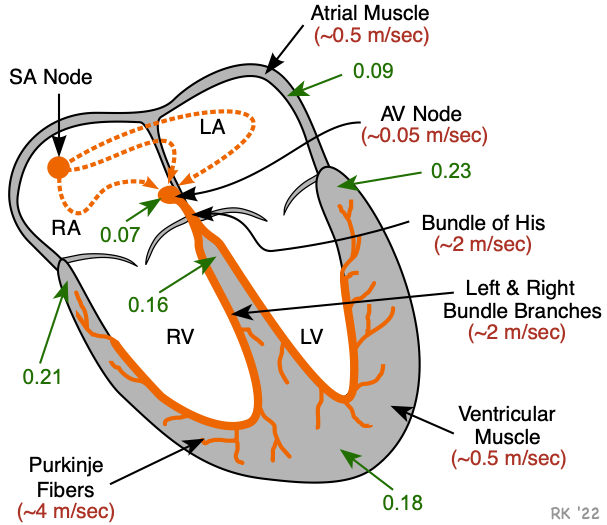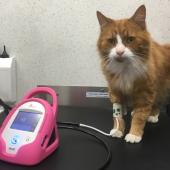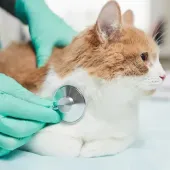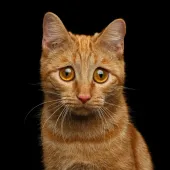Heart rhythm disturbance (atrial fibrillation)
Cats may experience a wide range of cardiac issues. There are several conditions that impact the heart's rhythm, such as atrial fibrillation. The most frequent correlation between this and serious cardiac disease is observed. Since atrial fibrillation does not manifest with any particular symptoms, it is rare that you will diagnose your pet's ailment with this condition. Cats with cardiac illness may exhibit difficult-to-identify symptoms such as extreme lethargy, inappetence, and fast or labored breathing. To get the greatest results, it is important to treat any heart problem seriously and to see your veterinarian as soon as possible.

What is atrial fibrillation?
Atrial fibrillation is one type of disturbance of the normal heart rhythm (dysrhythmia). To understand this disease we first need to know how the normal heart functions:
In the normal heart electrical activity is initiated from a natural pacemaker in the heart and follows a set path around the heart muscle. As the electrical activity moves through the muscle the muscle begins to contract. The electrical signals move in an ordered way like a wave over the heart surface from the chambers at the top of the heart (atria) to the lower chambers (ventricles). As the electrical signals pass through the heart muscle contracts in a synchronised fashion, like squeezing a tube of toothpaste. The heart is divided into a left and right side and there are 2 chambers on each side (one atrium and one ventricle, linked together through a valve). In the normal heart the upper chambers (the atria) contract first squeezing the blood out of the atria and into the main pumping chambers, the ventricles. When the ventricles are full they begin to contract to pump blood around the body (from the left side of the heart) or around the lungs (from the right side).

The atrial muscle is already strained in bigger hearts, which is where atrial fibrillation typically arises. A spontaneous electrical pulse in a location beyond the pacemaker may be more likely to occur if the stretching causes damage to the muscle. Normal electrical activity in the atria is disrupted in atrial fibrillation, which prevents normal atrial contraction and causes erratic, chaotic atrial muscle contractions. Because the electrical signals that the ventricles receive from the atria are random, so much more frequent, and chaotic than normal, the ventricles often do not have time to contract and relax before a new signal arrives telling them to contract again. Nevertheless, the electrical pathways in the ventricles are still intact, allowing the ventricular muscle to contract in an organized manner. Because of this, the intervals between heartbeats are irregular and the contractions are irregular. The characteristic lup-dup sound is replaced with an irregular jungle drum beat when you listen to a heart in atrial fibrillation. Atrial fibrillation is sometimes compared to the sound of shoes in a tumble drier.
Typically, atrial fibrillation is characterized by a fast heartbeat, as the ventricles contract so quickly that blood cannot fill them completely between beats. As a result, there is a decrease in the volume of blood exiting the heart, which can worsen heart failure and cause symptoms of exercise intolerance.
Why has my cat got atrial fibrillation?
Typically, cats with enlargement of the heart's top chambers (the atria) are the only ones who have atrial fibrillation. Numerous illnesses can be the cause of this cardiac enlargement. Congenital heart disease, in which the heart develops improperly from birth, is occasionally the cause. The most prevalent cause is cardiomyopathy, a disorder of the heart muscle that usually manifests in adulthood and develops after birth. Cardiomyopathy comes in various forms, the most prevalent of which being hypertrophic cardiomyopathy (HCM). In cats, dilated cardiomyopathy (DCM) is becoming uncommon.
A few medications might potentially result in atrial fibrillation, most notably digoxin, which is used to treat several cardiac conditions. Even if you believe your veterinarian is already aware, make important to let them know if your cat is on any medications.
How will my vet know that my cat has atrial fibrillation?
Your vet may suspect that your cat has atrial fibrillation when they listen to your cat/s heart. However, in order to confirm the diagnosis an ECG examination is essential. This is a simple test which records the electrical activity from your cat's heart. If atrial fibrillation is detected then other tests are indicated to look for underlying heart disease. These tests will almost certainly include X-rays and ultrasound examination of the heart but sometimes blood tests are also required.
Even for a vet, it is very difficult to accurately assess heart rate in atrial fibrillation without an ECG. This is because some of the heart beats are so weak that they are very hard to hear with a stethoscope and do not result in a pulse that is strong enough to feel.
What is the treatment for atrial fibrillation?
Although there are a number of treatments intended to help humans regain a normal heart rhythm, cats are rarely the targets of these operations. Treatment is required for the underlying heart disease that most cats with atrial fibrillation have. Certain drugs may be used in an attempt to slow down the heartbeat and give the heart more time to fully fill in between contractions. Monitoring your cat's heart rate accurately at home is quite challenging when they have atrial fibrillation. To ensure the issue is adequately addressed, your veterinarian may advise you to monitor your cat's breathing rate and other symptoms.
Will my cat get better?
It is unusual for cats with atrial fibrillation to ever go back to having a normal heart rhythm. Since cats with atrial fibrillation usually have a severe underlying heart disease the long term outcome is unfortunately not good in most cases.
Prevention and Management
Regular veterinary check-ups are essential for early detection, especially for senior cats. Maintaining a balanced diet, regular exercise, and avoiding toxic substances can contribute to overall heart health. Cat owners should also be cautious about administering any medications without veterinary supervision, as some drugs can trigger arrhythmias.





